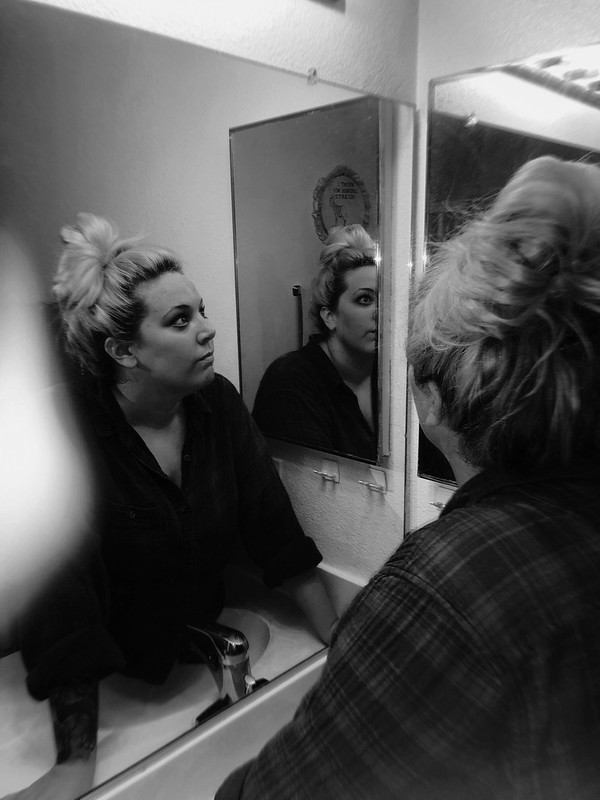“You are eating too much for your frame.” ~ my family doctor.
I was in his office after a year of effort and attempts to lose a pesky 20 pounds that had attached themselves to my body and wouldn’t let go. Twenty pounds took me to the top of my height/weight chart. I wasn’t obese or even technically overweight.
But when I teach people the merits of listening to your body, my own body is to some extent an advertisement of my own work. This model was not the one I wanted to have on the proverbial billboard, no matter how hypocritical it is of me to say that. I suddenly understood how frustrating it is to hear that weight doesn’t matter because it’s “all about how you feel.”
Sometimes it’s also about how you feel about how you look.
Over the year, other people gave me well-meaning but empty assurances: “It’s your hormones.” I knew it wasn’t, but my doctor did a work-up.
It wasn’t my hormones.
“Muscle weighs more that fat.” Could be, but the 2.5 hours of yoga I do per week are hardly jacking me into muscle density of that measure.
People can say things to us that we know are not true, even if it is meant to be soothing or reassuring. There are also things people tell us when they have no idea what else to say. Sometimes though, it may be better to just hold space and listen.
I tried walking more. I tried eating more fat. I tried increasing my protein. I worked on my sleep and digestion. I tried increasing my greens intake. I did all the things my Facebook groups told me to do, and nothing happened. I recognized the damage these “accountability groups” on Facebook can have on our mental processing of either success or failure.
“I went Keto and lost weight in two months! You should try it too!” is a strong oversimplification—and a rather unhealthy one for those who can’t seem to achieve the same success with the same ease.
Nobody is quite telling the whole truth on Facebook. And when you post “I started eating beans and the weight just fell off,” you aren’t either.
I took my own professional advice: I followed the plan I would give a client. My energy levels improved, I slept better at night, my skin looked better, I felt more vitality.
And even though I knew I was not “supposed to care” about weight, I did. My clothes didn’t fit, I didn’t feel like myself in my own body.
The latter is my life’s work.
After the visit to my doctor’s office, I turned my back on my own “follow your body” advice and I installed an app on my phone. For 2.5 months, I tracked my calories.
I felt ashamed doing this, as if I was a lung cancer specialist smoking on my break.
Science, not platitudes or intuition, emerged victorious. I lost 20 pounds and I gained a lot of wisdom into the very words I had given some of my own clients.
Weight can matter—20 pounds can be the difference between feeling like yourself and feeling like a different person.
Intuition isn’t everything. Sometimes we need tools beyond our own body’s wisdom. Tracking tools help give a baseline of truth to a feeling. There is room for both, and more of it than I had previously imagined.
Structure helps. Too many rules and we rebel, not enough and we have no structure. I needed both, and you probably do too. Success lies in the grey zone more than most of us want to admit.
Most of all, I worked through the inner conflict of holding one truth and secretly doing another. We have all done this to some extent. I was telling my clients to follow their body, but also whipping the app out of my pocket to track the smoothie I had consumed once they left. We probably all need to be a bit more honest with not only ourselves but also in our Facebook comments.
In my life, I have been behind closed doors with other professionals in the body positivity and intuitive trainer/intuitive eating circles who felt the same as I: we claim to clients that they should accept themselves as they are, but secretly struggle with it when it happens to us. Do we whip ourselves into a frenzy and make it look effortless or appear that we don’t care? Do we keep the weight and become advertisements for our own words or do we do some of the very things we suggest clients “free” themselves from, in order to get results?
It turns out: neither. I learned to hold two truths. We can both follow a structure and follow our body. We can both have a plan and simultaneously throw out the cultural conditioning and Instagram platitudes. We can both love and accept our body in fullness and yet be working on change and growth. It’s not turning our back on one to invite in the other.
But most importantly, a period of not being my own “billboard” actually gave me more compassion, more insight, and a more realistic view on what it means to have the same struggles I purport to solve.
I’ve heard it said that you want to do yoga with someone who has the body you want to have. Instead, I say that the best instructor or practitioner is someone who has had the same struggle as you. Even practitioners struggle to get it “right” for a lifetime. We are told to “walk our walk,” but as bodies shift, the walk might not work as it once did, and I advise that you seek a practitioner who is brave enough to try something new, to hold the door open for new ideas to enter in, and to try things out themselves that are not necessarily in line with what they have recommended for a decade or two. Look for a practitioner willing to be a scientist of the body and not simply a philosopher of the mind.
Your bravest practitioner is not someone who looks perfect or can do the fanciest pose. Today, I will also suggest that they may not be someone who is a model for letting intuition take the reins and run. The most solid instruction comes from someone who can hold complexity and duality, for we have lived both.
I offer clients the same intuitive instruction as I once did, but I also layer in advice to track and monitor in order to get baseline data. Both can exist.
Accept nothing less than someone who can be honest, who can share their failures, who had to learn the discomforts of the problem you have, and who can hold the two truths of 20 pounds. There is a gift in both struggling and failing, just as there is in structure and success.
There is room for both.
And also now more room in the waistband of my pants.
~







Read 2 comments and reply